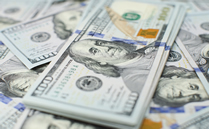 Perhaps pointing to uncertainty on tax reform and chaos in the White House, and owing to a lack of spending, companies are continuing to grow their cash piles.
Perhaps pointing to uncertainty on tax reform and chaos in the White House, and owing to a lack of spending, companies are continuing to grow their cash piles.
According to the Association of Finance Professionals’ latest second quarter AFP Corporate Cash Indicators report 41% of organizations polled held “larger cash and short‐term investment balances at the end of Q2 2017 than they did at the end of Q1 2017.” And 37% had “greater cash and short‐term investment balances at the end of Q2 2017 than they had one year earlier.”
The cash growth continues to be emblematic of what many companies see as too much uncertainty – both at home and abroad to not accumulate cash. This in a time of low interest rates when the borrowing’s easy.
Ratings agency Standard & Poor’s noted this in a report in May. It said cash and investments held by S&P Global Ratings’ universe of rated US nonfinancial corporate issuers “rose by 10% to $1.9 trillion in 2016 as the rich get richer: The top 1% [of US MNCs] control more than half of this cash pile.” But it also noted a troubling trend: rising debt. That debt, now at a collective $5.1 trillion for the 99%, “is a concern,” S&P said. “Adjusted leverage for both investment-grade and speculative-grade issuers is near decade highs and, conversely, the cash-to-debt ratio near decade lows.”
Moody’s reports similar growth for 2016, commenting in a recent report that the amount of cash held by US non-financial companies totaled $1.84 trillion at the end of 2016. That’s up 9.2% from $1.68 trillion at the end of 2015. The agency also noted that it was mainly concentrated in tech, with the top-five cash hoarders all coming from that cash-rich sector, with Apple holding a record high of $246.1 billion.
Moody’s adds that the latest increase in cash comes “despite an overall decline in revenue and cash flow from operations.” It says that the fall in revenue – down 5.3% to $10.2 trillion in 2016, reflected a “low growth global economic environment, still-challenging conditions in the energy, metals, and mining industries, and modest foreign-exchange headwinds.”
But what may be offsetting the decline in revenue may be that lack of spending, which helped boost the hoarding. Moody’s says spending on acquisitions was down 2% to $393, share buybacks dropped 21% to $212 billion and dividend payments fell 4.5% to $386 billion.
And the cash will continue to grow, according to AFP. Looking ahead, 32% of organizations anticipate expanding cash and short‐term investment balances over the next three months, while 24 percent plan to reduce these balances.